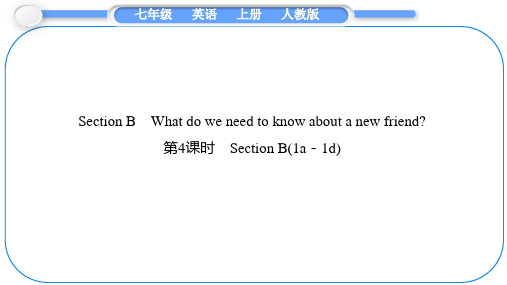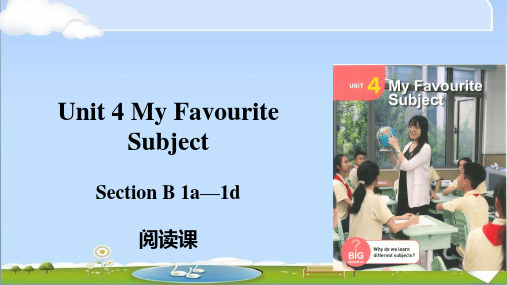第四课时 Section B (1a-1d)
Unit 1课件2024)英语七年级上册第4课时 Section B(1a-1d)

七年级 英语 上册 人教版
( C )3.We can get a lot of useful______on the Internet. A.class B.thing rmation
七年级 英语 上册 人教版
( B )4.Emma Brown can ______ English very well. A.say B.speak C.talk D.tell
七年级 英语 上册 人教版
( D )5.—How was your holiday in Sanya? —There were too many people, so I don't ______want to talk about it. A.too B.also C.only D.even
七年级 英般疑问句: ①Would +主语+ like sth?肯定回答:Yes, please.否定回答:No, thanks. ②Would +主语+ like to do sth? 肯定回答:Sure, I'd love/ like to. 否定回答:Sorry, I'm afraid I can't./I'd love to, but…
七年级 英语 上册 人教版
3.常用短语 (1)Beijing roast duck北京烤鸭 (2)live in …with sb和某人一起住在…… (3)after school放学后 (4)play the guitar 弹吉他 (5)in the school band在学校乐队里
七年级 英语 上册 人教版
七年级 英语 上册 人教版
二、单项选择。 (A )1.Peter likes music and he's ______ the school band. A.in B.with C.under D.from
初中英语九年级 Unit 2 第4课时 Section B (1a-1d)(说课稿)

初中英语九年级 Unit 2 第4课时 Section B (1a-1d)(说课稿)一. 教材分析本次说课的内容为初中英语九年级Unit 2第4课时Section B (1a-1d)。
本节课主要围绕着野生动物的保护展开,通过介绍不同动物的生活习性和生活环境,让学生掌握一般现在时的被动语态,并能够运用所学知识进行情景交际。
教材内容丰富,插图生动,有利于激发学生的学习兴趣。
二. 学情分析九年级的学生已经掌握了英语学习的基本语法和词汇,具备一定的听、说、读、写能力。
但学生在运用英语进行实际交流时,仍存在一定的困难。
因此,在教学过程中,教师需要关注学生的个体差异,充分调动学生的积极性,提高他们的语言运用能力。
三. 说教学目标1.知识目标:学生能够掌握一般现在时的被动语态,并能够运用所学知识进行情景交际。
2.能力目标:通过小组合作、讨论等方式,提高学生的口语表达能力和团队协作能力。
3.情感目标:培养学生关爱野生动物,保护环境的意识。
四. 说教学重难点1.教学重点:一般现在时的被动语态的用法。
2.教学难点:如何运用一般现在时的被动语态进行情景交际。
五. 说教学方法与手段本节课采用任务型教学法,结合情境教学法、分组合作法和交际法进行教学。
同时,利用多媒体课件、图片等辅助教学手段,提高学生的学习兴趣和参与度。
六. 说教学过程1.导入:教师通过展示野生动物的图片,引导学生谈论自己喜欢的动物,从而引入本节课的主题。
2.呈现:教师通过课件展示1a-1d的内容,引导学生关注动物的生活习性和生活环境。
3.操练:学生分组进行角色扮演,运用一般现在时的被动语态描述动物的生活习性。
4.实践:学生分组讨论,如何保护野生动物和环境,并展示讨论结果。
5.巩固:教师设计拓展任务,让学生运用一般现在时的被动语态描述自己的日常生活。
6.总结:教师引导学生总结本节课所学内容,强调关爱野生动物,保护环境的重要性。
七. 说板书设计板书设计如下:1.主题:野生动物的保护2.语法点:一般现在时的被动语态3.交际场景:描述动物的生活习性、保护野生动物和环境八. 说教学评价教学评价主要通过以下几个方面进行:1.课堂参与度:观察学生在课堂上的积极性、主动性和合作意识。
人教版九年级全一册英语同步培优Unit 2 课时4 Section B (1a-1d)

want htooumseaskewtihthemthseelhveelsphoafvteheneawshleoso. ks and have a good year.
are scary.
2. Let’s eat out. I’ll ___t_r_ea_t___ (招待)today. 3. He ____li_t____ (点燃)the candles and blew them out in
one go at his birthday party.
返回
trick, spider, ghost, treat, light 4. I’m sure that there are no ___g_h_o_st_s__in the world. 5. We are playing __t_r_i_ck__s__on that monkey who keeps
人教河南 九年级全
UNIT 2 I think that mooncakes are delicious!
课时4 Section B (1a-1d)
习题链接
提示:点击 进入习题
基础巩固练
能力提升练 答案显示
1 spiders 6 ask; for
11 C
2 treat
7 looked scary
12 D
返回
B. ECvehnintahoisuaghcomuanntryyowf itthheacluosntogmansdharivcehfhaidsetodrayw. 1a1y.
新人教版英语七年级上册 Unit 4 第四课时 Section B 1a-1d

Review
按要求写出正确的单词、词组或句子。
1.听 (短语) __li_s_te_n_t_o
2. 擅长(短语) _____b_e_good at
3. 记住(动词) _r_e_m_e_ber
4. 每个人(名词) _____e_v_eryone
5. 和……一样(短语) t_h_e_s_a_m__e_as 6. 特别的 (形容词) ____s_p_ec_i_a_l _
numbers. We learn how to work out
in class在课上
feel like感觉像是
maths problems in class. It feels like magic and is really fun. Maths is very
magic n. 魔法
useful adj. 有用的 a useful lesson 一节有用的课
class schedule课程表
English
maths
Chinese
history
PE
biology
music
geography
Prediction(预测)
Look through the passage and answer these questions.
look through浏览
1. What kind of passage is it?
Sunday is the first day of the week. 第一天
Sunday Sun - day
/ˈsʌn/ /deɪ/
Chinese English math music
一周的 第二天
What day is it ? Monday Mon - day
Section B (1a-1d)

___ a go out ___ h see friends c do his homework ___ e practice the guitar ___ ___ b do the dishes g watch TV ___ ___ d help his mom make breakfast ___ f clean his room
breakfast clean his room
× × √ √ × √ √
1c Listen again. Write when Dave has
to follow the rules in the chart in 1b. Choose from the phrases in the box.
on school nights every Saturday before dinner in the evening
Ⅱ. 单项选择
B late for class. 1. ______ A. Don’t to be B. Don’t be C. Don’t D. No 2. --______sing! --All right. B A. Let B. Let’s C. We let A 3. When will the train ______? A. arrive B. arrive at C. arrive in
Ⅲ. 句型转换
1. We can wear hats in school. (改一般疑问句并进行否定回答) --Can you wear hats in school? --No, we can’t.
2. No foods in class. (变同义句) ______ Don’t ______ eat in class. 3. You have to wear sports shoes for PE class.
Unit4SectionB1a-1d教学设计2023-2024学年人教版七年级英语上册

学习者分析
1. 学生已经掌握了哪些相关知识:学生在之前的课程中已经学习了英语字母、单词、简单句型等基础知识,对英语阅读和写作有一定的了解。他们已经掌握了如何使用一般现在时进行描述,对人称代词和形容词性物主代词的使用也有一定的了解。
板书设计:
① 一幅家庭照片,旁边标注 "I have a happy family."
② 一个人物图片,旁边标注 "She is my best friend."
③ 一组人物图片,旁边标注 "They are my classmates."
教学反思与改进
在教学Unit 4 Section B 1a-1d的过程中,我进行了以下设计反思活动,以便评估教学效果并识别需要改进的地方。
2. 学生的学习兴趣、能力和学习风格:学生们对新鲜有趣的事物比较感兴趣,因此在本节课中,通过引入西方节日的趣味性内容,可以激发他们的学习兴趣。在学习能力方面,学生们已经具备了基本的阅读理解能力和一定的写作能力。在学习风格上,学生们更倾向于通过互动和参与式的方式进行学习,因此需要设计一些小组活动和学生展示的环节。
鼓励学生提出自己的观点和疑问,引导学生深入思考,拓展思维。
技能训练:
设计实践活动或实验,让学生在实践中体验Unit 4 Section B 1a-1d知识的应用,提高实践能力。
在Unit 4 Section B 1a-1d新课呈现结束后,对Unit 4 Section B 1a-1d知识点进行梳理和总结。
b) 相关词汇和短语:提供一份与西方节日相关的词汇和短语列表,方便学生查阅和学习。
Unit 4 Section B 1a-1d(人教版七年级下册英语第四单元精品课件)

When
a
go out
×
on school nights
h
see friends
×
on school days
c
do his homework
√
after school
e
practice the guitar
b
do the dishes
g
watch TV
×
d help his mom make breakfast
f
clean his room
√
before dinner
√
after dinner
in the evening
√
every morning
√
every Saturday
1d Talk about the rules in Dave’s house.
He can’t watch TV in the evening.
it's good for his health. 4. He has breakfast and supper at home,
but he has lunch in the d _in_i_n_g__ hall. 5. Go to w a_s_h__ your hands.
They are very dirty.
V. 选择正确的动词填空。
1. (Can/Does) __C_a_n__ we eat in class? 2. (Don't/Has to) _D_o_n__’t_ wear a hat in class! 3. Does Bill (have to/can)_h_a_v_e__t_o_ go to bed now? 4. Francisco and Andrew (can't/don't)
Unit 4 Don’t eat in class (Section B 1a-1d)

Unit 4 Don’t eat in class. (Section B 1a-1d)教学目标:一、知识与技能1. Words: out, go out, dish, do the dishes, night, before2. Sentences:①Don't leave the dirty dishes in the kitchen.②I can't relax either.③I must read a book before I can watch TV.④I have to help mom make breakfast.二、过程与方法:Listening and speaking\ writing methods. Pair work三、情感态度与价值观:..If we keep the rules , we will live in a peaceful world.教学重点:1、重点词汇:in class, classroom, hallway, arrive late, outside, fight, can, can't, have tosee friends/ do his homework/ practice the guitar/ watch TV/ do the dishes2 、重点句型:He can’t go out on school night.3、语言结构:①祈使句②情态动词can 表示许可的用法。
教学难点:1、用英语讨论有关规定2、情态动词must和have to 的用法。
教学方法:Listening and speaking \writing methods. Pair work教学准备及资源的利用:A tape recorder、A projector.教学过程:Step1.Warm-up and revisionShow pictures of some daily activities. Help Ss review the phrases.1. go out on school nights2. see friends3. do his homework4. practice the guitar5. do the dishes6. watch TV7. help his mom make breakfast 8. clean his roomStep2. Free Talk.A: What are the rules?S1: Don’t eat in the class.S2: We can’t run in the hallways.Step3. Learn the new wordsShow some new words. First let the Ss learn them in groups, then ask some Ss to read them. If the Ss can’t read the word , the teacher will teach. At last let the Ss do some exercise.New words and phrases: out, go out, dish, do the dishes, night, before, see friends/ do his homework/ practice the guitar/ watch TV/ do the dishes英汉互译1.练习吉他2.洗碗3.外出4. see friends5. in the hallways 在走廊里6. on school daysStep4. PresentationTask1 Show Ss some pictures , then let Ss talk about them with “What can’t he do?,S1: He can’t go out on school nigh t.S2: He can’t see friends after school.Let the students practice in pairs. Try to act it out in front of the class.Task2 Practice the conversation use “must / have to /”Step5. Consolidation.Work on 1b(1)Listen and put an×for things Dave can’t do and a √for things he has to do.(2)Check the answers.A: Can Dave …?B: Yes, he can./No, he can’t.Work on 1cListen again. Write when Dave has to follow the rules in the chart in 1b. Choose from the phrases in the box.on school nights every Saturday before dinner in the eveningon school days after dinner after school every morningWork on 1dTalk about the rules in Dave’s house.A: Can Dave go out on school nights?B: No, he cant.A: Does Dave have to do his homework after school?B: Yes, he does.Step6. training:当堂训练一选择1. There is _____milk on the floor.(A . too many B. too much)2. There are ____rules in my family. A. too many B. too much3. Please help me _____ French. A. speaking B speak4. He often _____English with the foreign teachers. A practices speak B practices speaking5.I have to go there _____English on Sundays. A. learn B to learn6.No __________! A .swim B swimming二句型转换1. He has to wear uniform.(变否定句)He _____ _____ _____ wear uniform.2. I have to wear sneakers for gym class.(一般疑问句及肯定回答)_____ you ____ ____ wear sneakers for gym class? Yes, I ____.3. They have to wash clothes.(提问)____ do they have ____ ____?4. You can’t go out on school nights.(同义句)_______ go out on school nights.5. Don’t talk in class.(同上)______ ________!三.根据汉语完成句子(20分)1.周末她必须帮妈妈做饭。
